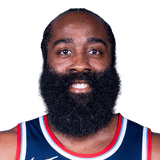
Six Unsung Heroes From The 2017 NBA Playoffs
We’re nearly through the first two rounds of the NBA playoffs, and the stars have grabbed the spotlight, per usual. Kawhi. King James. The Beard. KD, Steph, Klay and Draymond. John Wall. Isaiah Thomas. Those are the ones you see and hear about every day. But their efforts haven’t come without the support of their teammates, many of whom haven’t received the credit they deserve.
With us almost at the midpoint of the 2017 postseason, here's a look at some of the unsung heroes still remaining in the playoffs.
Deron Williams has been the best three-point shooter this postseason. Wait, what? That’s right, at 60% (9 of 15) from deep, the 32-year-old is leading the way. Kyle Korver is the more famed three-point marksman off the Cleveland bench, but Williams appears to have found the fountain of youth (or maybe playing with James is the fountain of youth). What makes Williams so good is that he complements James so well: He’s a good ball-handler but certainly doesn’t need the ball in his hands, and he remains a capable playmaker, especially in Cleveland’s stretch-the-floor-supreme lineup of Williams, James, Kyle Korver, Iman Shumpert and Kevin Love, a group that owns the playoff’s fourth-best offensive rating (min. 40 minutes). He’s shooting 62% overall and has turned the ball over just seven times in 128 playoff minutes. Williams is playing 16 minutes per game, and his experience, shooting and lead–guard abilities have been a revelation for a Cleveland team that had no backup point guard plan whatsoever until Williams arrived.

Think about where JaVale McGee has been. He got cut by the cellar-dwelling 76ers a couple of years back. In the three seasons before this one, he played 62 games total. And now, he’s a crucial part of the league’s best team, doing exactly what the undersized Warriors are asking of him: creating extra possessions. McGee’s 6.8 offensive rebounds per 48 minutes is second-best in the playoffs among teams still playing, and he’s shooting 73% from the field. He’s also averaging 1.4 blocks per game, sixth-best among players on teams still in the running for the Larry O’Brien Trophy.

Porter Jr. has quietly been very good in what has been the most entertaining second round series so far—and not for the reason you may think. The regular season’s fifth-best three-point shooter has made just one-third of his attempts this season, but it’s been his shooting inside the arc—an absurd 67.9%—that’s been so impressive. That number is the best by a non-center in the playoffs since 2010. A big part of his strong shooting has been his ability to force turnovers (nine steals in four games against the Celtics) and get out in front in transition. The Celtics have attempted to hide Isaiah Thomas on Porter Jr. during this series, but the 6’7” Porter Jr. has taken advantage, posting up the 5’9” Thomas and scoring with ease.

He’s probably best known for being on the receiving end of Kelly Oubre Jr.’s now-infamous shove, but Olynyk has actually been quite effective off the bench, shooting over 53%. He's also one of only two Celtics making over half of their playoff field–goal attempts. He’s posting a very solid 14.3 defensive rebounding percentage, which is key for a team that generally struggles on the glass.

This is a tough one because so many players not named James Harden have stepped up in a major way for the Rockets. But Capela has not only stepped up; he has become even more vital with the news that his backup, Nene, will miss the rest of the postseason. Capela is the playoff’s top remaining shot blocker at 2.7 rejections per game; he averaged just 1.2 in the regular season. He’s also averaging north of eight rebounds per game and ranks sixth in the NBA in total rebounds this postseason. With Nene out, Capela will be asked to play a few more minutes and play them well. Whether he can do so will be a big part in determining whether the Rockets can continue their run.
In the Spurs’ best game of this postseason—a 25-point shellacking of the Rockets in Game 2—Simmons poured in 14 points and added in a 15 plus/minus off the bench. And even in Sunday’s Game 4 loss, Simmons showed that he can be counted on, scoring a team-high 17 in just over 22 minutes. He’s third on the team in total points in the second round. Simmons’ stats, though, tell only a very small part of the story. He’s an elite athlete and a very good wing defender, which is what San Antonio needs to close out this series, and Gregg Popovich, in turn, has given the lanky Texas native nearly 20 minutes per game after playing him about 10 minutes per game in round one (including one DNP-Coach’s Decision). If the Spurs can overcome Parker’s absence and advance past Houston, look for Simmons to be a big reason why.
